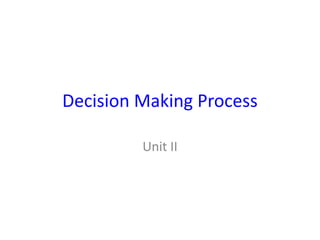
Decision making , rr mob.2011(3)
- 1. Decision Making Process Unit II
- 2. Decision making. – The process of choosing a course of action for dealing with a problem or opportunity. 2
- 3. How are decisions made in organizations? Steps in systematic decision making. – Recognize and define the problem or opportunity. – Identify and analyze alternative courses of action, and estimate their effects on the problem or opportunity. – Choose a preferred course of action. – Implement the preferred course of action. – Evaluate the results and follow up as necessary. 3
- 5. Types of Decisions. 1. Programmed Vs Nonprogrammed decisions – Programmed decisions. • Involve routine problems that arise regularly and can be addressed through standard responses. – Nonprogrammed decisions. • Involve nonroutine problems that require solutions specifically tailored to the situation at hand 2. Major Vs Minor decisions 3. Individual Vs Group decisions 5
- 6. Conditions that Affect the Possibility of Decision Failure Organizational Problem Low Possibility of Failure High Certainty Risk Uncertainty Ambiguity Programmed Nonprogrammed Decisions Decisions Problem Solution 6
- 7. 1. Rational Perspectives on Decision Making 7
- 8. Six Steps in the Managerial Decision Making Process 8
- 9. Decision Making Steps Step 1. Recognize Need for a Decision – Sparked by an event such as environment changes. • Managers must first realize that a decision must be made. Step 2. Generate Alternatives – Managers must develop feasible alternative courses of action. • If good alternatives are missed, the resulting decision is poor. • It is hard to develop creative alternatives, so managers need to look for new ideas. 9
- 10. Decision Making Steps Step 3. Evaluate Alternatives – What are the advantages and disadvantages of each alternative? – Managers should specify criteria, then evaluate. 10
- 11. Decision Making Steps Step 3. Evaluate alternatives 11
- 12. Decision Making Steps Step 4. Choose Among Alternatives – Rank the various alternatives and make a decision – Managers must be sure all the information available is brought to bear on the problem or issue at hand 12
- 13. Decision Making Steps Step 5. Implement Chosen Alternative – Managers must now carry out the alternative. – Often a decision is made and not implemented. Step 6. Learn From Feedback – Managers should consider what went right and wrong with the decision and learn for the future. – Without feedback, managers do not learn from experience and will repeat the same mistake over. 13
- 14. The Administrative Model of Decision Making 14
- 15. The Scope of Decision Making 1. Individual decision making 2. Group decision making 3. Organizational decision making 4. Metaorganizational decision making 15
- 16. Advantages and Disadvantages of Group and Team Decision Making 16
- 17. Methods of Group Decision Making • Nominal Group Technique – Members silently and individually generate ideas – They present without discussion – Discussion and clarification – Silently rate – Group decision is the pooled outcome of votes 17